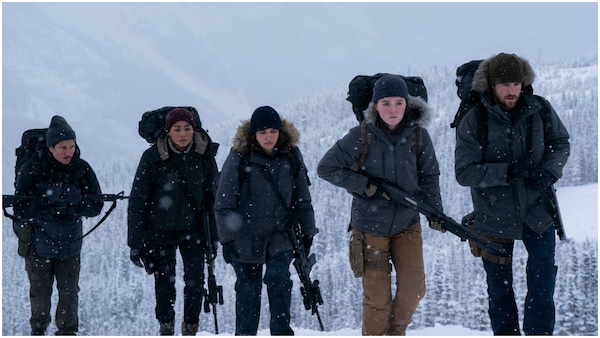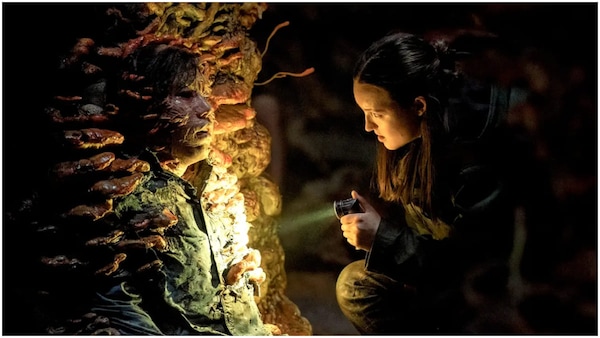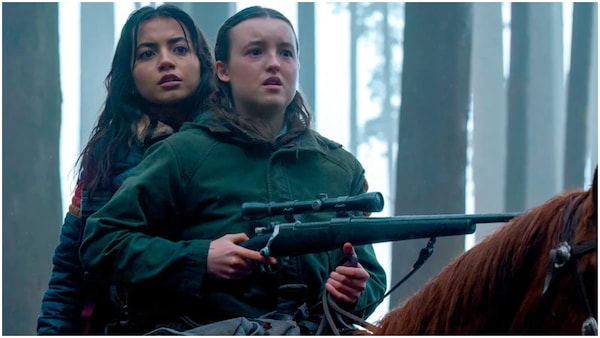The Last of Us Season 2 Review: Pedro Pascal pulls at our hearts as the journey wobbles but won’t fall
The Last Of Us Season 2 Review: Craig Mazin’s follow-up to a phenomenal season with Pedro Pascal and Bella Ramsey is not as perfect, but also doesn't make you lose hope.

Last Updated: 01.25 PM, May 26, 2025
The Last Of Us Season 2 Review Story: Five years have passed since we last saw Joel (Pedro Pascal) make that impulsive, unforgettable choice—saving Ellie (Bella Ramsey) from becoming a lab experiment at the cost of many lives. Now, Joel, Ellie, Tommy, and Tommy’s wife reside in Jackson, Wyoming—a gated survivor community with its own ecosystem. But the infected are evolving, knocking at their doors with new ferocity. Alongside them comes Abby (Kaitlyn Dever), a woman seeking vengeance. Meanwhile, Ellie is forming a complex bond with Dina (Isabela Merced). When tragedy strikes, Ellie, with Dina by her side, sets out on a revenge-driven path—searching not only for justice, but also for purpose and redemption.
The Last of Us Season 2 Review:
Craig Mazin’s stories are often not about events, but people—what they suffer, what they search for, and how they survive. Like Chernobyl, which wasn’t just a documentary-style retelling of a disaster, but a collective narrative about human cost and buried truths, The Last of Us is also about people surviving the impossible. When Mazin adapted the acclaimed video game with Neil Druckmann, many wondered how he’d find a fresh hook in yet another post-apocalyptic setting. And he found it in Joel—a man scarred by loss, making terrible decisions in a terrible world.
So, when Joel met Ellie—a girl who became the last missing piece after the loss of his daughter—Mazin didn’t just revive a world plagued by death; he resurrected a man. Through Joel, we understood Ellie. Through Ellie, we rediscovered hope. Season 1 ended on a high note, not because Joel saved Ellie, but because he chose love over logic, humanity over sacrifice. This weighty decision set a near-impossible benchmark, which is why revisiting that emotional groundwork in a Season 2 review feels necessary. Meanwhile, watch all these fresh releases on Lionsgate, Zee5, and more.

Now, Mazin and Druckmann return with a second season set five years after the events of Season 1, much like the sequel game. This time, the focus shifts. While Joel and Ellie’s dynamic still anchors the story, the show begins to explore a broader, bleaker world—a world where the virus has firmly taken root, and hope is a rare commodity. Jackson is fortified and alert. Patrols leave daily, knowing they might not return alive—or worse, return infected.
From the very first frame, the show refuses to waste time. It dives straight into tension and sets up a grim tone that never loosens. Beneath that is a complicated rift between Joel and Ellie. Once a tightly bonded pair, they now resemble estranged family—and the reason for this distance slowly unfolds throughout the season.
Episode 2 delivers a gut-punch of a twist (yes, gamers were prepared—but no one’s truly ready for that moment). It shakes the foundation of the show and launches Ellie’s transformation into the protagonist of her own dark journey. She is no longer the girl Joel protected. She’s now the avenger, the survivor, and the seeker of her own identity.

The tonal shift is abrupt but intentional. Some may feel it arrives too soon, but others will admire the bold pacing. However, this brave narrative risk becomes a double-edged sword. Episodes 3 and 4 feel stagnant in comparison. After such a powerful high in Episode 2—with an infected onslaught and raw emotional devastation—the slower pace that follows makes the momentum falter.
From this point, Ellie’s story leads her to Seattle, accompanied by Dina. Here, new factions are introduced: the WLF and a cult called the Scars, who follow the prophecy of an Angel. While both groups seem fascinating on the surface, the show gives us only a glimpse of their world. We don’t learn enough to invest in their ideologies or their internal conflicts. Saving their deeper storylines for Season 3 might be a misstep, especially since there isn’t enough intrigue built yet to keep us curious.
What is compelling, however, is how the show treats the infected. Time has passed, and these creatures are no longer mindless threats. They’ve evolved. They coordinate. They wait, they strike, and the virus has adapted—now airborne as well as bloodborne. The stakes are higher than ever.

Pedro Pascal remains a powerhouse. His absence in the latter half of the season will be deeply felt. Bella Ramsey proves yet again she’s more than capable of carrying the emotional weight, and her performance is both heartbreaking and raw. Isabela Merced is a welcome addition—wild and vulnerable in equal measure. Kaitlyn Dever, despite limited screen time, leaves a strong impression. Her expanded role in Season 3 will likely challenge Ellie’s spotlight, and it’ll be fascinating to see how that dynamic unfolds.
The Last Of Us Season 2 Review: Final Verdict:
Craig Mazin’s second installment of The Last of Us doesn’t quite reach the brilliance of Season 1—but it never loses its emotional grip. It shifts gears, it stumbles a bit, but it refuses to fall. Season 3 remains highly anticipated—but it will need to rediscover its rhythm.
The Last of Us Season 2 is not currently streaming on JioHotstar in India. Stay tuned to OTTplay for updates on this and everything else from the world of streaming and cinema.
Subscribe to our newsletter for top content, delivered fast.

